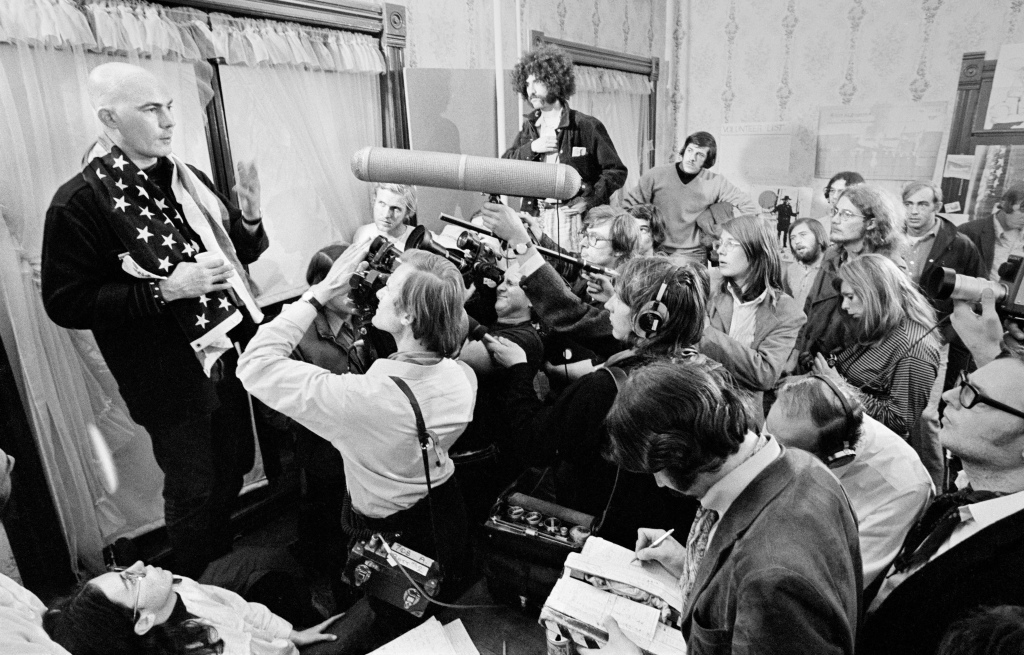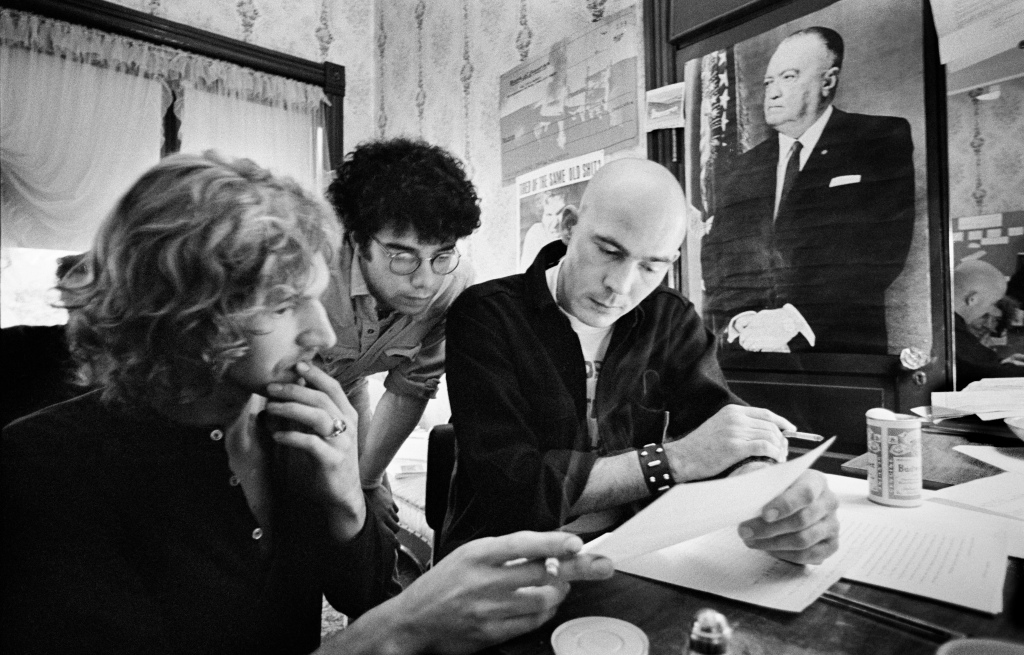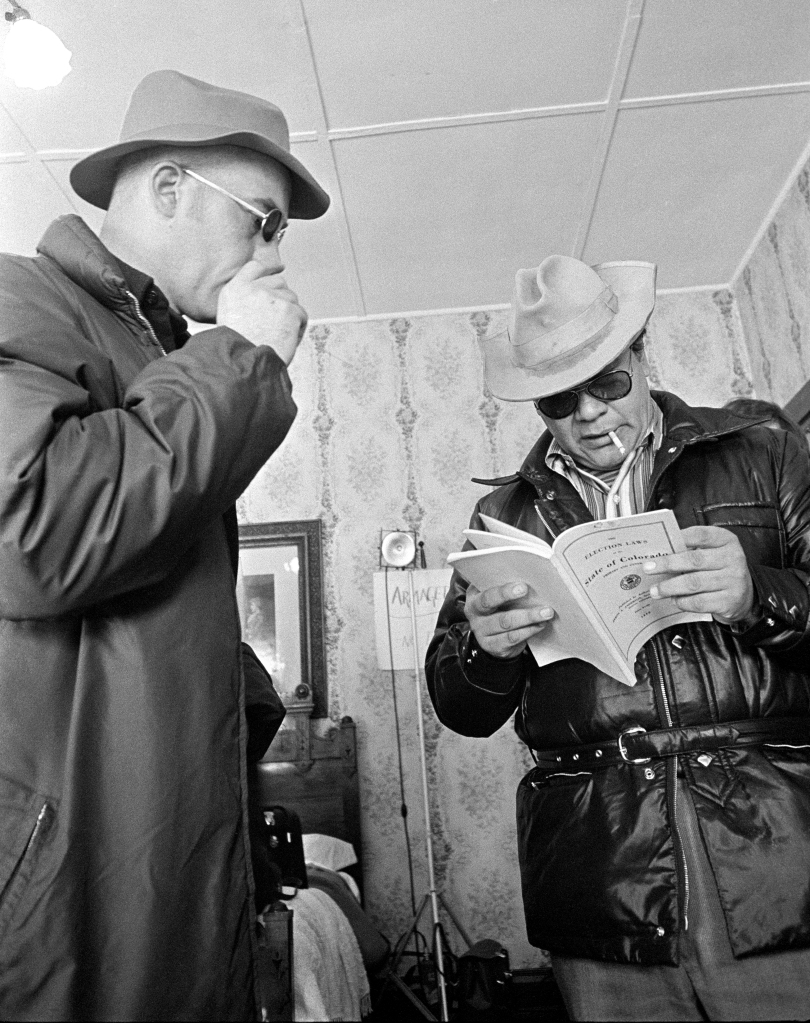
As we close in on election day in the most contentious and insane presidential election in living memory, one question that keeps popping up across the media landscape is this – “What would Hunter S. Thompson have to say about the current election and the sorry state of American politics?”
It is a fair question to ask. As the author of Fear and Loathing: On the Campaign Trail ’72, Hunter S. Thompson was responsible for one of the most incendiary and celebrated books on the circus that is American politics. His coverage for Rolling Stone was a revelation at the time and is as fresh and compelling today as ever. Indeed, many so-called journalists and pretenders to the throne could do well to go back and read Thompson’s coverage and learn about the difference between actual insightful and revealing writing and that of merely serving up sycophantic bulletin board puff pieces for their preferred candidate. Thompson took no prisoners and skewered politicians on both sides. It was a brave thing to do in the era of Nixon but then Thompson was no ordinary journalist. He refused to merely stand on the sidelines, sniping at the participants – Thompson got directly involved. In 1970 he ran for Sheriff of Pitken County, Colorado, on the Freak Power ticket in a surreal campaign that drew international attention. And he almost won. Though he lost the battle, his campaign kick-started a political movement in Aspen that ultimately won the war, the reverberations of which still ripple throughout the community today.
The new documentary Freak Power: The Ballot or the Bomb, co-directed by Daniel Joseph Watkins and Ajax Phillips, tells the story of Thompson’s campaign and builds upon Watkins’ previous effort, the hugely impressive book Freak Power: Hunter S. Thompson’s Campaign for Sheriff (reviewed here). In addition to the massive volume of research that they had from that project, they discovered a virtual treasure trove of original campaign footage, some of it not even developed, which forms the basis of this new film. Essentially, this allowed Watkins and Phillips to tell the entire story of Thompson’s run for sheriff using original footage from 1970, filmed as the campaign progressed. Watkins also discovered nearly 3000 photographs from the campaign taken by David Hiser and Bob Kreuger. It is truly remarkable material that presents the real Hunter S. Thompson, totally unfiltered as he makes a serious attempt to affect political change in his home town.

The directors made the sensible decision to let this extraordinary footage tell the story through the participants own words, captured as they were on the scene in 1970. Complimenting this are several voice-overs from the individuals involved, from Bob Braudis (former Sheriff of Pitken County) and Joe Edwards (former Pitken County commissioner) to the artist Ralph Steadman and Jann Wenner of Rolling Stone. In a clever move, we don’t actually see these people until the very end, 50 years later, which proves to be strangely poignant.
I don’t want to give a complete breakdown of all the footage here or indeed the story. I think it is best that you see it unfold for yourself but I will say this – the parallel with what is happening today is uncanny. Through sheer serendipity, Freak Power: The Ballot or the Bomb serves to show us how little has changed in 50 years. The dynamics involved, the generational clashes and dirty political tactics deployed by the establishment are frighteningly familiar and relevant. One such powerful example of this is the scene at the beginning of the film as the incumbent Sheriff, Carrol D. Whitmire, representing the Democratic Party, debates Thompson. When asked about the source of Thompson’s support, Carroll responds – “I don’t know what Freak Power is. I don’t know what they are talking about when they talk about Freak Power.” Thompson’s answer was as salient then as it is today – “[Freak Power] is the ability to act, to have control over your environment, to have control of your government. My idea of running for sheriff is to expand the notion of the office. As it is now you just don’t talk to a cop, they are the enemy and that’s true not only of Aspen but of all over the country. That’s a dangerous situation when the enforcement arm is totally out of communication with the reality…It is time that we either bridge that chasm with some kind of realistic law enforcement or else I don’t think it is going to be bridged in this country, we are going to have revolution.”

As someone who has invested many years writing and researching about Hunter S. Thompson for my PhD, I have to say it is a delight to see the man treated onscreen in a serious, respectful manner. Hunter on film has been very hit and miss over the years and there has always been a temptation to indulge the Gonzo persona or idle celebrity gossip. The film also benefits from the focus being solely on his pre-Fear and Loathing days, with none of the over-the-top theatrics that define his later career. I have always maintained the view that Hunter S. Thompson’s career in the decade prior to Fear and Loathing in Las Vegas is actually the most interesting period of his life and the one which arguably contains his best work. Thankfully, more and more people are now discovering the incredible output from Hunter during this period (I highly recommend his letters collection The Proud Highway in this regard)
Freak Power shows us the serious writer and concerned citizen from that period, determined to take a stand against the greedheads that threatened his community. It reminds us that there was a lot more to Hunter S. Thompson than drugs and bad behavior. Clearly the film was a labor of love for all involved and this is reflected in every aspect of the production, from the soaring soundtrack to the unmistakable film poster by none other than the legendary Ralph Steadman. I also believe that the film contains the only known footage of Hunter with his legendary attorney, Oscar Zeta Acosta, who is shown briefly with Thompson on election night as he learns of his political fate.
On that note, I will leave you with words from Thompson himself, from his concession speech, as though he is speaking to us today – “Unfortunately I proved what I set out to prove ….that the American Dream really is fucked.” However, as Thompson’s campaign manager Ed Bastian added – “In retrospect, we can see that it was a really powerful oar-stroke forward for the change and political dynamics in the valley area around Aspen. All of the things we did…they all set the stage for what was to soon follow.” Thompson’s would later offer the mantra – “Politics is the art of controlling your environment.” He proved that to be the case by getting involved and taking action. We can all learn from that.
Freak Power is out now on Amazon, Vimeo and Apple – visit freakpower.com to learn more.
Watch the trailer below: